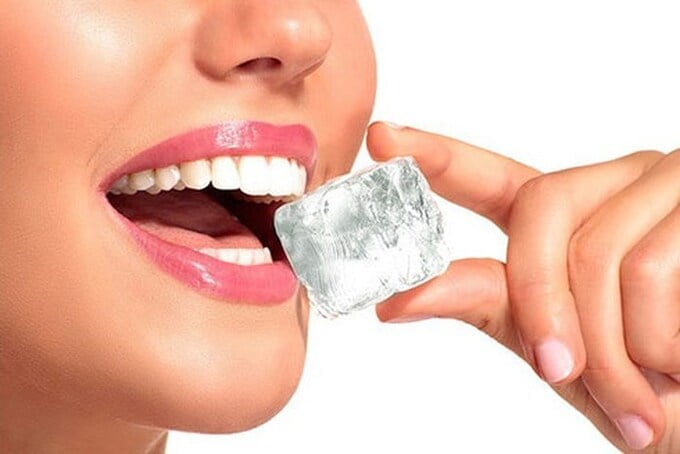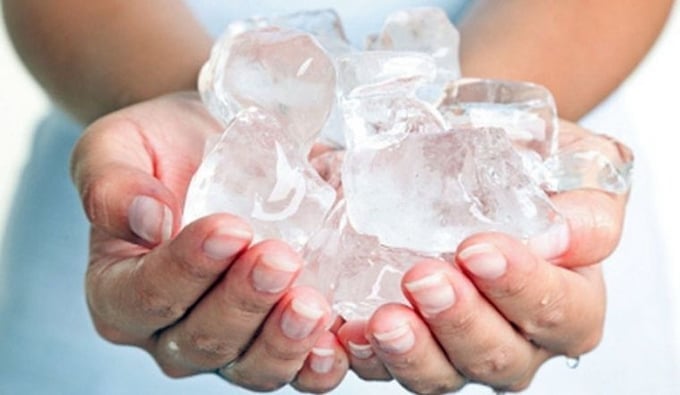Occasionally chewing on an ice cube from a cold drink is fine. This can help provide much-needed hydration, especially on hot days.
However, according to health website Very Well Health, frequent cravings and chewing of ice can be a sign of underlying health problems and can potentially lead to complications related to teeth, mental health, and nutrition.

Illustration photo
Why do many people like to eat ice?
There are many reasons why people crave ice. One of these reasons is dehydration. Mild dehydration can also cause people to crave ice. Ice cubes cool and soothe dry mouths and lips, in addition to quenching thirst. They can also help lower body temperature on hot days.
Symptoms of mild dehydration include thirst and darker urine. Anyone with more severe symptoms of dehydration, such as seizures or feeling dizzy, confused or disoriented, will need emergency treatment.
Additionally, some studies suggest that craving ice may be the result of nutritional deficiencies. Studies have shown that craving ice may be a sign of zinc or calcium deficiency.
Some studies have also shown that some people with iron deficiency may experience sudden cravings for ice. The cravings increase as iron levels in the body become depleted.
Additionally, the urge to chew ice can be a sign of Pica syndrome, a disorder that leads to overeating of foods that have no real nutritional value.
Certain emotional issues can also cause people to want to chew ice. For example, someone who is stressed may find that chewing ice helps relieve stress. Obsessive-compulsive disorder (OCD) can also be a cause. OCD is a mental health condition that causes compulsive behaviors or obsessive thoughts.

Illustration photo
Is chewing ice dangerous?
Chewing ice is not necessarily a dangerous act, but it can cause some health problems.
The most common side effect of chewing ice is the risk of serious tooth damage, according to the American Dental Association (ADA).
Accordingly, the ADA recommends not eating ice because it can cause the enamel (the outermost layer on your teeth) to wear away quickly, making your teeth more sensitive and susceptible to cavities.
Chewing ice can also cause a tooth to crack, causing pain. If not treated promptly, a crack in the tooth will not only cause you extreme pain but can spread, leading to serious inflammation and decay.

Illustration photo
In addition, ice chewing addiction can also aggravate the condition in anemic patients without knowing it. Liking ice chewing is a sign of anemia, the most common cause of which is iron deficiency. When there is iron deficiency, the body will not have enough hemoglobin (a protein responsible for carrying oxygen to the body's tissues), causing people to feel tired, weak, pale skin, prone to headaches, dizziness, shortness of breath, cold hands and feet...
There is no definitive research yet on why people with iron deficiency crave ice, but some theorize that consuming ice can help patients feel more comfortable. So anyone who has a persistent craving for ice that lasts longer than a month should make an appointment with their doctor to see if there is an underlying cause.
Eating ice can also lead to eating problems. Aside from providing hydration, ice, unlike food, has no nutritional value. This is why eating large amounts of ice over long periods of time in place of other foods and drinks can lead to eating problems. People who crave ice may end up eating more ice than they realize. Adding sugar or other flavorings to ice can lead to weight gain and other problems associated with excessive sugar consumption.
--> 6 steps to manage blood sugar during hot weather
Source: https://giadinhonline.vn/vi-sao-nhieu-nguoi-thich-an-da-lanh-d199187.html


![[Photo] Prime Minister Pham Minh Chinh chairs the Government's online conference with localities](https://vphoto.vietnam.vn/thumb/1200x675/vietnam/resource/IMAGE/2025/10/5/264793cfb4404c63a701d235ff43e1bd)


![[Photo] Opening of the 13th Conference of the 13th Party Central Committee](https://vphoto.vietnam.vn/thumb/1200x675/vietnam/resource/IMAGE/2025/10/6/d4b269e6c4b64696af775925cb608560)






















![[Photo] Prime Minister Pham Minh Chinh launched a peak emulation campaign to achieve achievements in celebration of the 14th National Party Congress](https://vphoto.vietnam.vn/thumb/1200x675/vietnam/resource/IMAGE/2025/10/5/8869ec5cdbc740f58fbf2ae73f065076)




































































Comment (0)